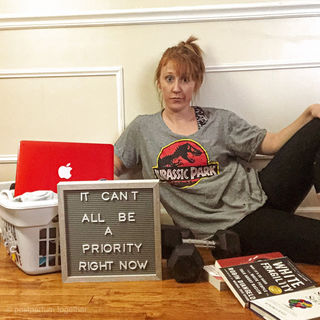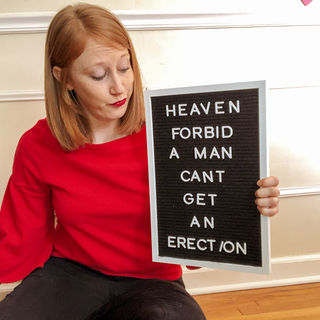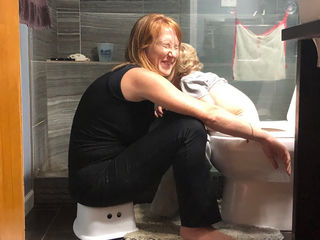Postpartum Depression
Postpartum During a Pandemic
Postpartum is already challenging. What about during COVID-19?
Posted April 22, 2020
Maggie and I are both fascinated by social media discourse, and particularly any conversations that center around bodies and health crises. We've researched the infertility community on Instagram (Bethany never thought to turn to Instagram during treatment), and then we had to make an account for work. This was a very awkward endeavor for us (trained academics who don't have experience marketing our research), but the upside is we've met some incredible people.
Today we are interviewing Chelsea Skaggs of Postpartum Together. Not only does she have an excellent Instagram account with relatable, vulnerable images, but she fosters necessary dialogue about the difficulties of the postpartum period, and she runs an online group for newly postpartum folks. We began by discussing COVID-19 and the postpartum experience, then we asked about her work.
As someone who works with postpartum women, how do you think COVID-19 is changing postpartum experiences right now?
We are seeing a lot of changes for women who are entering postpartum during this season. First of all, many women are grieving the loss of a picture they had in their mind—from the birth experience to bringing baby home to meet the family to have more in-person support. We must have permission and space to grieve that loss while also holding the gratitude women have for this time of their lives. (I remind people that grief and gratitude are not mutually exclusive!)
We have to get more creative with support—how do we stay connected to friends and family and other aspects that make women feel like themselves? Postpartum can be an isolating time already, so adding on social distancing means women need, more than ever, more access to virtual supports and resources to keep them connected. On the flip side, some women have the chance to embrace the slow-down of postpartum. So many other cultures prioritize a slow transition, and in America, we are typically more fast-paced. With COVID-19, many women have the chance to step back, slow down, and have that time to rest and restore while having intimate time with the immediate family.

How are you and your family doing in all this?
Every day is different for us. I know personally having things I can't control is an anxiety trigger, so I have been extra mindful to carve out time for joy and being present. I am also tempted to measure my value in how productive I am, and right now, my brain needs a lot more time to restore (more sleep and downtime), and I've had to challenge the belief I've held all my life about productivity.
It has been very introspective. Some days feel heavy—seeing the impact on our family, our friends, and extended family, but it also feels so refreshing to be living with fewer complications. The pandemic allows us to remove some of the stressors our family was falling into that aren't part of our values; ultimately, we have "sifted out" things, and I appreciate that. I wish it weren't because of such tough circumstances.
How do you use social media to communicate with various audiences?
I use social media to engage in taboo topics and give folks a place to talk about subjects they often don't feel safe to discuss in other areas. I create platforms for postpartum education, but even more so, a place for people to see they aren't alone in their situations. I find social media is a place people often want to connect and are quicker to be honest when given a space to do so.

What do you wish you had for support when you had your babies?
I wish someone had just taken away the illusion of the "perfect mom" from me. I wish I saw more examples of messy, tough parenthood transitions and had the safety to be honest about my uncertainties and struggles. I had professionals to support breastfeeding and tell me I was "clear" to exercise, but I needed someone to say, "It's OK if this takes longer than you imagined and looks and feels messier than you thought it would."
What prompted you to start Postpartum Together?
I started my brand after hitting a wall trying to have it all together. I realized how much I missed out on genuinely connecting with myself and others in my first postpartum by being more attentive to what I thought I "should" be instead of giving myself room to experience and process my journey. As I sought that community during my second postpartum, I realized so many are missing that connection after they have the baby. There are so many "how-to" spaces and perfectly curated blogs and feeds, but I knew what I needed was more realness, and I got feedback that other women were longing for that too. Postpartum Together is about the real, raw, messy postpartum and being safe to do that together.

What message(s) do you think new parents need to hear?
There is no badge waiting for people who get through postpartum without asking for help. This season is full of transitions—many that we aren't prepared for well—and it's something every new parent is going through whether you can see it on the outside or not. You don't have to figure it all out right now, and there's no "right" way to be a parent. Seek out less "how-to" spaces and more "me too" spaces.
We realize that not everyone can shelter in place and that there are postpartum folks in this group as well. One of the things this outbreak underscores is that we haven't created safe spaces for everyone to live and work or walk through the postpartum period. It's a great time to think about what can be done differently and better.




